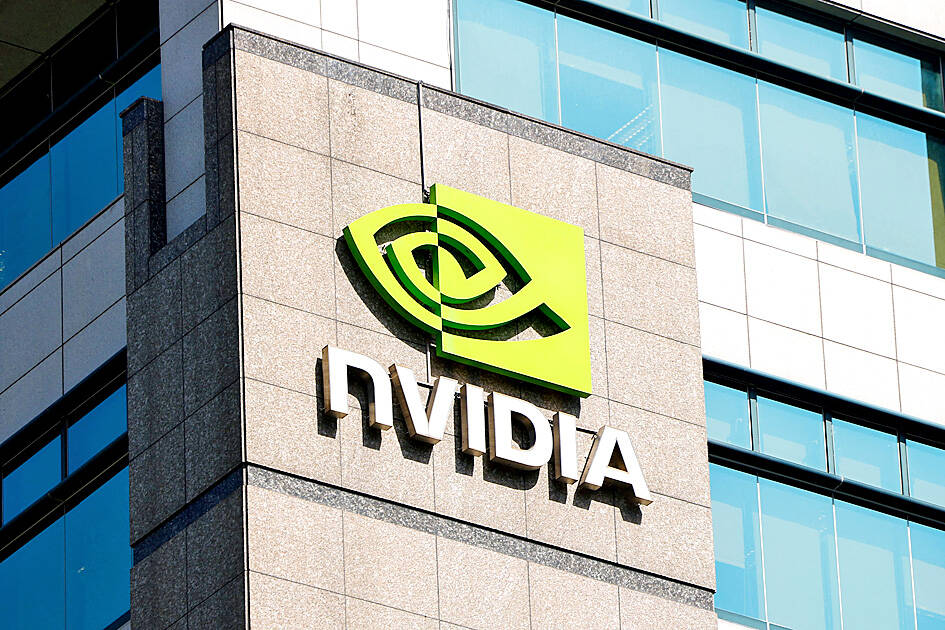Two years after Nvidia Corp made history by becoming the first chipmaker to achieve a US$1 trillion market capitalization, an even more remarkable milestone is within its grasp: becoming the first company to reach US$4 trillion.
After the emergence of China’s DeepSeek (深度求索) sent the stock plunging earlier this year and stoked concerns that outlays on artificial intelligence (AI) infrastructure were set to slow, Nvidia shares have rallied back to a record.
The company’s biggest customers remain full steam ahead on spending, much of which is flowing to its computing systems. Microsoft Corp, Meta Platforms Inc, Amazon.com Inc and Alphabet Inc are projected to put about US$350 billion into capital expenditures in their upcoming fiscal years, up from US$310 billion in the current year, according to the average of analyst estimates compiled by Bloomberg. Those companies account for more than 40 percent of Nvidia’s revenue.

Photo: Ann Wang, Reuters
A 67 percent gain from an April low has pushed Nvidia’s market capitalization to US$3.8 trillion, overtaking Microsoft at US$3.7 trillion to again become the world’s most valuable company. Nvidia shares rose 1.8 percent on Friday to close at another record high.
With a broadening customer base clamoring for Nvidia’s latest AI accelerators and competitors still distant, bulls are betting the chipmaker’s shares have plenty of room to run.
“We believe that Nvidia is truly uniquely positioned, and that it will sustain its position over the next decade-plus,” said Aziz Hamzaogullari, founder, chief investment officer and portfolio manager of the growth equity strategies team at Loomis, Sayles & Co.
Hamzaogullari is not alone. Loop Capital Markets LLC analyst Ananda Baruah raised Nvidia’s price target to US$250 from US$175, a level that would equate to about a US$6 trillion market value. Baruah, who has a buy rating on the stock, expects annual AI spending from various types of customers to rise to nearly US$2 trillion by 2028.
“While it may seem fantastic that Nvidia fundamentals can continue to amplify from current levels, we remind folks that Nvidia remains essentially a monopoly for critical tech, and that it has pricing (and margin) power,” Baruah wrote in a research note on Wednesday.
Meanwhile, Nvidia insiders sold more than US$1 billion worth of company stock in the past year, with a notable uptick in recent trading activity as executives capitalize on surging investor interest in AI, the Financial Times reported yesterday.
More than US$500 million of the share sales took place this month as the California-based chip designer’s share price climbed to an all-time high, the report said.
Nvidia chief executive officer Jensen Huang (黃仁勳) started selling shares this week for the first time since September last year, the US Securities and Exchange Commission’s filing showed.
Additional reporting by Reuters

GROWING OWINGS: While Luxembourg and China swapped the top three spots, the US continued to be the largest exposure for Taiwan for the 41st consecutive quarter The US remained the largest debtor nation to Taiwan’s banking sector for the 41st consecutive quarter at the end of September, after local banks’ exposure to the US market rose more than 2 percent from three months earlier, the central bank said. Exposure to the US increased to US$198.896 billion, up US$4.026 billion, or 2.07 percent, from US$194.87 billion in the previous quarter, data released by the central bank showed on Friday. Of the increase, about US$1.4 billion came from banks’ investments in securitized products and interbank loans in the US, while another US$2.6 billion stemmed from trust assets, including mutual funds,

AI TALENT: No financial details were released about the deal, in which top Groq executives, including its CEO, would join Nvidia to help advance the technology Nvidia Corp has agreed to a licensing deal with artificial intelligence (AI) start-up Groq, furthering its investments in companies connected to the AI boom and gaining the right to add a new type of technology to its products. The world’s largest publicly traded company has paid for the right to use Groq’s technology and is to integrate its chip design into future products. Some of the start-up’s executives are leaving to join Nvidia to help with that effort, the companies said. Groq would continue as an independent company with a new chief executive, it said on Wednesday in a post on its Web

Even as the US is embarked on a bitter rivalry with China over the deployment of artificial intelligence (AI), Chinese technology is quietly making inroads into the US market. Despite considerable geopolitical tensions, Chinese open-source AI models are winning over a growing number of programmers and companies in the US. These are different from the closed generative AI models that have become household names — ChatGPT-maker OpenAI or Google’s Gemini — whose inner workings are fiercely protected. In contrast, “open” models offered by many Chinese rivals, from Alibaba (阿里巴巴) to DeepSeek (深度求索), allow programmers to customize parts of the software to suit their

JOINT EFFORTS: MediaTek would partner with Denso to develop custom chips to support the car-part specialist company’s driver-assist systems in an expanding market MediaTek Inc (聯發科), the world’s largest mobile phone chip designer, yesterday said it is working closely with Japan’s Denso Corp to build a custom automotive system-on-chip (SoC) solution tailored for advanced driver-assistance systems and cockpit systems, adding another customer to its new application-specific IC (ASIC) business. This effort merges Denso’s automotive-grade safety expertise and deep vehicle integration with MediaTek’s technologies cultivated through the development of Media- Tek’s Dimensity AX, leveraging efficient, high-performance SoCs and artificial intelligence (AI) capabilities to offer a scalable, production-ready platform for next-generation driver assistance, the company said in a statement yesterday. “Through this collaboration, we are bringing two